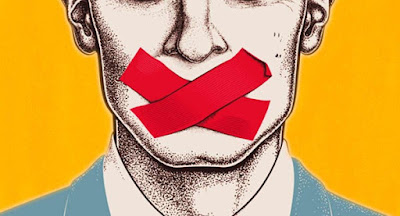Monday, February 3, 2020
Monday, January 27, 2020
Surveillance, Suppression and Intimidation: Tools for the Super-Rich?
by Nomad
Farrow's book actually deals with the story behind his expose of the allegations against media mogul and accused sexual predator, Harvey Weinstein. He reveals each painful step- from unsubstantiated rumors to firm allegation. To his credit, Mr. Farrow was relentless in seeking out women who privately claimed to have been sexually assaulted.
Yet, Weinstein had powerful friends who were willing to shelter him. And he also lots of tools at his disposal to block journalists and silence accusers. After all, sordid things that Weinstein did was pretty much of an inside secret in Hollywood. According to reports, wealthy Weinstein could afford to pay off his alleged victims (with non-disclosure agreements attached). If that didn't work, there was always the power of threats. According to his alleged victims, he could and would apply tremendous amounts of pressure on uncooperative individuals.
And he did just that... over decades.
Monday, January 20, 2020
President Trump, the Republican Party and the Parrington Question
by Nomad
 Most of you have probably never heard of Vernon Parrington. I know I hadn't until I stumbled upon an interesting quote. That's pretty remarkable because, in our grandparent's time, historian Parrington occupied a special place, particularly among the progressive-minded.
Most of you have probably never heard of Vernon Parrington. I know I hadn't until I stumbled upon an interesting quote. That's pretty remarkable because, in our grandparent's time, historian Parrington occupied a special place, particularly among the progressive-minded.The Parrington Question
This Midwestern educator was also the author of the three-volume Main Currents in American Thought (1927) which went on to win the 1928 Pulitzer Prize for History As his biography reminds us, for two decades this historical examination and analysis was one of the most influential books for American historians.Progressive history was a set of related assumptions and attitudes, which inspired the first great flowering of professional American scholarship in history...His progressive interpretation of American history was highly influential in the 1920s and 1930s and helped define modern liberalism in the United States. After receiving overwhelming praise and exerting enormous influence among intellectuals in the 1930s and 1940s, Parrington's ideas fell out of fashion before 1950.
Monday, January 13, 2020
Tuesday, January 7, 2020
History Has Shown Us the Dangers of a Weak Congress and Where It Leads
by Nomad
When the Democratic-led House of Representatives was attempting to investigate the allegations against President Trump in drawing up articles of impeachment, there was no mistaking contempt the president's and his allies had for Congress.When Congress called key witnesses to testify, the president ordered them to ignore subpoenas. It was, Trump claimed, a witch hunt. Congress quite rightly pointed out it was simply fulfilling its legitimate, constitutional oversight role.
The House could have issued criminal and civil fines, including jail time. Instead, it allowed the president to block the inquiry with impunity. Wasn't this an unequivocal act of obstruction? No, said the administration, it was an assertion of executive privilege.
Subscribe to:
Posts (Atom)



